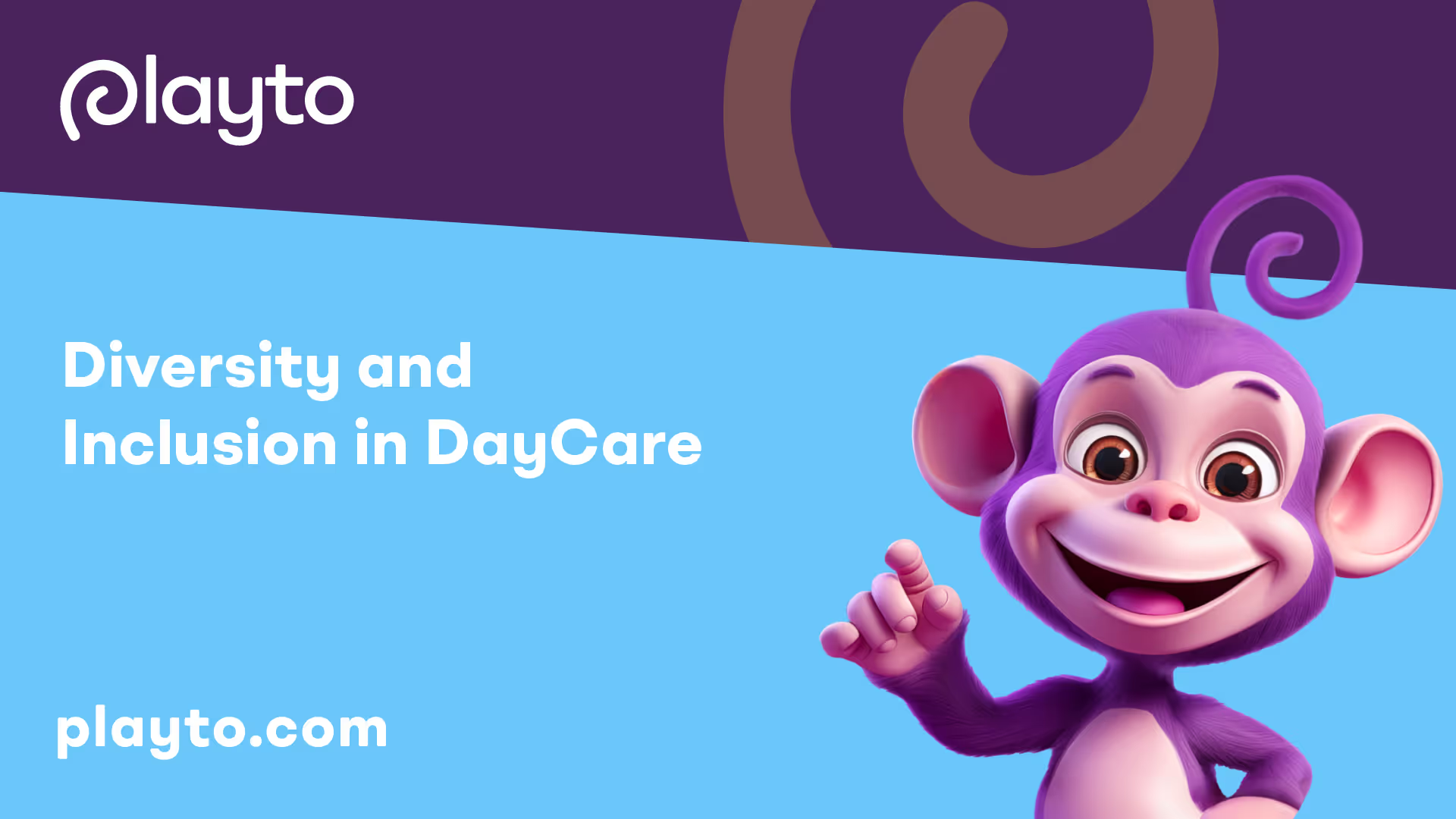
Diversity and Inclusion in Daycare
Creating an environment that embraces diversity and inclusion is essential in daycare settings. This approach not only fosters positivity but also enhances children's understanding of the world around them.
Early Childhood Education and Diversity Awareness
Early childhood education plays a pivotal role in shaping children's perceptions of diversity. Research indicates that children can comprehend messages about race as early as six months, and by age five, they associate various traits and stereotypes with race based on their surroundings. Therefore, introducing concepts of diversity and inclusion at a young age is critical in combating racism and bias later in life.
Incorporating diverse themes into the curriculum allows children to engage in positive and open conversations about differences. This exposure not only helps instill compassion, kindness, and empathy but also enhances self-confidence and self-perception. Daycare providers can utilize various strategies to cultivate this awareness:
Promoting Inclusive Learning Environments
Promoting an inclusive learning environment involves creating a space where all children feel welcomed and valued regardless of their background. Implementing an anti-bias curriculum is one way to achieve this goal. Such a curriculum highlights differences among individuals, encouraging children to recognize social inequities and develop the skills necessary to support others.
To effectively promote inclusivity, daycare centers can implement the following practices:
- Engagement with Families: Foster relationships with families to understand their unique cultural backgrounds, creating a welcoming atmosphere and involving families in the learning process.
- Staff Training on Diversity: Equip staff with the knowledge and skills needed to address and embrace diversity in their teaching methods.
- Open Discussions: Encourage children to discuss their feelings and experiences related to diversity, fostering a greater understanding among peers.
Implementing Anti-Bias Curriculum
An anti-bias curriculum plays a crucial role in fostering diversity and inclusion in daycare settings. This approach helps children not only recognize but also understand social inequities while developing essential social action skills.
Recognizing Social Inequities
Children as young as six months can observe differences in skin color, and by age five, they often associate certain traits with race based on their surroundings. Therefore, it is vital to implement an anti-bias curriculum that highlights these differences among people. This helps children recognize social inequities and challenges stereotypes among their peers, fostering a more inclusive environment. Incorporating diversity, equity, and inclusion values in early childhood education combats racism and bias effectively.
- 0-6 months: Beginning to observe differences.
- 6-12 months: Noticeable reactions to varied traits.
- 1-3 years: Curiosity about diversity and exploration of differences.
- 3-5 years: Associative thinking about race and stereotypical associations.
Implementing activities such as storytelling about diverse cultures, sharing family traditions, and celebrating cultural festivals ensures that children can see and appreciate the richness of differences. By engaging with their peers and educators from varied backgrounds, children develop a sense of belonging and respect for diversity.
Developing Social Action Skills
An effective anti-bias curriculum not only promotes awareness of inequities but also equips children with social action skills. This encompasses teaching them how to support others and advocate for fairness in their environments. Children learn to recognize unfair situations and develop the confidence to address these issues, fostering a culture of empathy and support.
Planning inclusive activities that highlight social justice encourages children to speak up about inequities they may observe in their daycare environments. By integrating these lessons into everyday interactions, educators lay the foundation for lifelong values of respect and inclusion.
Through positive relationships with diverse peers and educators, children feel acknowledged and valued. This sense of belonging is essential for their future health and well-being.
Fostering diversity and inclusion in daycare settings is essential for shaping future generations. By implementing an anti-bias curriculum, caregivers can cultivate a nurturing environment where all children recognize and celebrate differences.
Benefits of Diverse Teaching Staff
A workforce that reflects a variety of backgrounds and experiences contributes significantly to the overall quality of daycare programs. This diversity among teaching staff offers numerous advantages, particularly in fostering academic growth and emotional resilience among children.
Academic and Emotional Impact
Research shows that children benefit academically and emotionally when their early childhood teachers and staff mirror their unique and diverse backgrounds. According to Brightwheel, children thrive when they can see themselves reflected in their educators. This connection not only enhances engagement but also fosters a sense of belonging, encouraging better participation in learning activities.
By having diverse educators, children gain access to varied perspectives, promoting a deeper understanding of different cultures, lifestyles, and experiences.
Advancing Diversity Policies
Hiring a diverse teaching staff is not just beneficial for the children; it also plays a crucial role in advancing diversity policies within educational institutions. Implementing such policies is essential for creating an equitable learning environment. Staff members in early years settings should undergo diversity training to understand the needs and experiences of children from different backgrounds. This training can include cultural differences, language barriers, and support for children with disabilities, contributing to a more inclusive learning atmosphere.
- Inclusivity Practices: Promotes fairness and addresses biases.
- Cultural Competence Training: Equips staff with skills to support all children.
- Community Engagement: Strengthens relationships with families and communities.
Having a workforce that is sensitive to diversity also provides a more welcoming environment for families, fostering better communication and collaboration, as described in the article on building parent-provider relationships. Such policies not only improve the educational experience for children but also set a positive precedent for the community at large.
Overall, a diverse teaching staff creates a foundation for a thriving, inclusive daycare environment, positively impacting children's academic and emotional development while reinforcing essential diversity policies.
Fostering Inclusive Communication
Inclusive communication is key to promoting diversity and inclusion in daycare settings. By fostering open dialogue among staff, families, and the community, daycare providers can create a welcoming and supportive environment for all.
Staff, Family, and Community Engagement
Incorporating values of diversity, equity, and inclusion into communication strategies enhances relationships among staff, families, and the community. This approach creates a welcoming atmosphere where everyone feels accepted and respected. Engaging in meaningful conversations with families not only helps to acknowledge their unique backgrounds but also fosters strong partnerships that benefit the children.
Effective engagement strategies include:
- Organizing community events that celebrate cultural diversity
- Providing multilingual resources to accommodate non-English-speaking families
- Encouraging family input on curriculum and activity planning
An inclusive environment nurtures respect and understanding within the daycare community. For more information on building parent-provider relationships, visit our helpful resources.
Awareness of Implicit Biases
Understanding implicit biases is vital in promoting equity in daycare settings. Implicit biases are attitudes or stereotypes that affect understanding, actions, and decisions unconsciously. Acknowledging and addressing these biases among staff ensures a fair and respectful environment for all children and families.
Key actions to raise awareness include:
- Training programs on recognizing and combating implicit bias
- Regular discussions about the impact of bias on children’s development
- Setting clear policies regarding discrimination or harassment due to race, color, national origin, sex, disability, or religion (StopBullying.gov)
By fostering awareness of implicit biases, daycare providers can help mitigate discrimination and create a supportive climate that upholds the core tenets of diversity and inclusion in daycare.
Gathering insights from families about their cultural backgrounds allows for a more inclusive daycare program. Acknowledging and respecting cultural differences is essential, as it encourages positive interactions and fosters a sense of understanding and respect among children [5].
Strategies for Supporting Culturally Diverse Families
Supporting culturally diverse families in daycare settings is essential for fostering an inclusive environment. By implementing various strategies, daycare providers can build appreciation for differences and challenge prejudices and discriminatory behavior.
Building Appreciation for Differences
Creating a culture of appreciation for differences within daycare environments is crucial. According to the Be You, daycare providers should get to know families to avoid making assumptions about their backgrounds. Engaging with families promotes positive attitudes and practices regarding diversity.
Key strategies include:
- Celebrating Cultural Events: Organize events that honor various cultural celebrations. This allows children and families to share their traditions, fostering a sense of belonging.
- Diverse Learning Materials: Incorporate books, toys, and pictures that reflect the diversity of the community and enhance children's understanding of different cultures [3].
- Inclusive Activities: Design activities that encourage children to share their cultures, experiences, and heritage. This not only builds appreciation but also enriches the learning experience for all children.
Strategy Description
- Cultural Celebrations: Organize events to celebrate various cultural traditions.
- Diverse Learning Materials: Use resources that represent different cultures.
- Inclusive Activities: Enable sharing of personal experiences and heritage.
Challenging Prejudices and Discriminatory Behavior
Addressing and challenging prejudices within daycare settings is vital for creating a truly inclusive atmosphere. Supporting families who have faced discrimination entails engaging in thoughtful conversations, demonstrating empathy, and promoting inclusive practices.
To effectively challenge prejudices, providers can:
- Facilitate Open Discussions: Encourage dialogues around diversity and inclusion, creating a safe space for families to express their concerns and experiences.
- Provide Accurate Information: Increase knowledge about cultural diversity and the importance of acceptance among children, families, and staff [5].
- Offer Support Services: Ensure families have access to resources and support services to address issues of racism and discrimination. This could include workshops or connecting families with community organizations.
Strategy Description
- Open Discussions: Create spaces for expressing concerns and experiences.
- Accurate Information: Educate families about cultural diversity.
- Support Services: Provide resources for families facing discrimination.
By implementing these strategies, daycare providers can foster a nurturing and inclusive environment that values diversity and strengthens relationships within the community.
Early Years Settings for Equality and Diversity
Creating supportive and inclusive environments in daycare settings is vital for promoting diversity and inclusion in daycare. This section focuses on two critical aspects: establishing safe and supportive environments and ensuring exposure to diverse experiences.
Safe and Supportive Environments
Early childhood education provides opportunities for children to engage in positive conversations about differences, which helps shape their opinions and attitudes towards diversity. It instills values such as compassion, kindness, open-mindedness, and empathy while also enhancing self-confidence and self-perception.
Creating a safe and supportive environment involves:
- Inclusive Resources: Providing a variety of materials, such as books, toys, and pictures, that reflect the diversity of the children and families served in the setting.
- Diversity Training: Staff members should undergo training to understand the needs of children from different backgrounds. This ensures that educators are equipped to handle cultural differences and support children with disabilities [3].
- Safe Spaces: Daily interactions and routines should foster a sense of belonging, where every child feels valued and heard.
ElementI mportance
- Inclusive Resources: Encourages appreciation for differences.
- Diversity Training: Enhances staff capability in inclusivity.
- Safe Spaces: Promotes emotional well-being.
Exposure to Diverse Experiences
To fully benefit from a diverse learning environment, children need exposure to varied experiences that reflect cultural diversity. This can include:
- Cultural Celebrations: Organizing events that celebrate different cultures helps children learn and appreciate uniqueness.
- Guest Speakers: Inviting family members or community leaders to share their experiences and cultural backgrounds fosters understanding and connection among children.
- Curriculum Integration: Incorporating diverse themes, stories, and activities into the curriculum enriches children's perspectives and understanding.
Exposure to diversity not only enhances children's social development but also contributes to their academic success, as studies show that children thrive academically and emotionally when learning in a diverse environment [1].
By prioritizing safe environments and diverse experiences, daycare providers can nurture an inclusive atmosphere that benefits all children. Implementing these strategies not only supports individual growth but also promotes a culture of respect and equality within the community. For more on building parent-provider relationships, check out our article on building parent-provider relationships.
References
[1]: https://mybrightwheel.com/blog/diversity-in-early-childhood-education
[2]: https://www.prosperoteaching.com/blog/2023/03/promoting-equality-diversity-in-early-years-settings
[3]: https://beyou.edu.au/fact-sheets/relationships/supporting-cultural-diversity
[4]: https://www.vancopayments.com/education/blog/promoting-cultural-diversity-child-car
